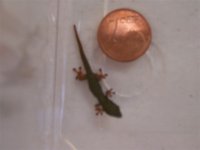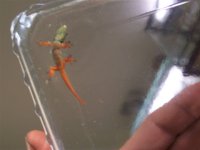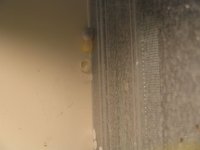You are using an out of date browser. It may not display this or other websites correctly.
You should upgrade or use an alternative browser.
You should upgrade or use an alternative browser.
Finally Lygodactylus williamsi hatchlings!!
- Thread starter sanderfrog
- Start date
Lygodactylus
New member
Congratulations! So also for your eggs it took a long time to hatch, as I expected. Looks like this species is comparable to other species in that aspect. Good luck with raising them!
jaswa
New member
great job Sander!
so now I must ask...it looks like your eggs were not glued to the corner of a large vivarium like mine are.
I've learned that L.williamsi are gluers. Did yours lay their eggs in that little jar? From looking at the hatchlings, do you think an adult would try to gobble one up, if given the chance?
I'm asking because I might need to remove the adults from my enclosure where they are currently hovering around the lights and yes, the female glued the eggs in the corner up near the light. I'm not even thinking about trying to move the eggs.
did you mist the eggs ever? How did you maintain relative humidity or did you keep them dry?
Sorry so many questions...I'm just brand new to tiny egg gluing geckos but I don't want to lose any of the babies. Thanks a bunch!!
Jason
so now I must ask...it looks like your eggs were not glued to the corner of a large vivarium like mine are.
I've learned that L.williamsi are gluers. Did yours lay their eggs in that little jar? From looking at the hatchlings, do you think an adult would try to gobble one up, if given the chance?
I'm asking because I might need to remove the adults from my enclosure where they are currently hovering around the lights and yes, the female glued the eggs in the corner up near the light. I'm not even thinking about trying to move the eggs.
did you mist the eggs ever? How did you maintain relative humidity or did you keep them dry?
Sorry so many questions...I'm just brand new to tiny egg gluing geckos but I don't want to lose any of the babies. Thanks a bunch!!
Jason
BlackMetalMaster
New member
Congratulations! 90 days again, it's interesting. I guess it's also the night temperature drop when incubation takes place in the Terrarium. Good luck with raising them!
sanderfrog
New member
First off all thanks for the replies.
About the eggs, mine were also glued on top of the rail from the front slide door. Also I covered the eggs with a little plastic box so the adults couldn't reach the hatchlings cuz I dont know if they would harm them but you never know.
As for humidity the eggs are hardshelled so I didn't mist them at all, but when theyre glued near the lights I would be weary for overheating the eggs.
regards Sander
About the eggs, mine were also glued on top of the rail from the front slide door. Also I covered the eggs with a little plastic box so the adults couldn't reach the hatchlings cuz I dont know if they would harm them but you never know.
As for humidity the eggs are hardshelled so I didn't mist them at all, but when theyre glued near the lights I would be weary for overheating the eggs.
regards Sander
M.A.L.T. Geckos
New member
They're adorable! Very awesome babies!
CONGRATS... thats fabulous.. im nowhere near that stage as my geckos have not arrived yet... im still trying to research everything i can first...
this is my first post here and i joined due to the fact im thinking of owning two of these beautiful geckos.. and this was the only forum on th enet with posts about this species
does anyone have a care sheet as i want to get it perfect for them arriving thanks..
I would be very grateful
xxx
this is my first post here and i joined due to the fact im thinking of owning two of these beautiful geckos.. and this was the only forum on th enet with posts about this species
does anyone have a care sheet as i want to get it perfect for them arriving thanks..
I would be very grateful
xxx
Last edited:
jaswa
New member
lygodactlyus williamsi, first baby found today
I'm on the board with a 1 for 6...dang unimpressive in my mind but at least i had one hatch. I had to lose 5 other eggs in the process, but I believe i'v learned from my mistakes.
These guys like to glue their eggs in the corner of the enclosure for some reason and I tried to cover them with a deli cup, which i spent way too much time chopping to get just the right angle on it. Finally i just took the adults out of the enclosure with the glued eggs and walaaa...i finally see a baby in there today. I had 5 others which i believe hatched and became a snack for the adults that were still in there. That's my guess, because I never saw what happened to them. Eggs just dissappeared.
today this little guy was out of his egg and poking around looking for food i'm sure. Very small, less than 3/4 inch total length. he fed on some mango nectar today. I'll try small fruit flies and phoenix worms tomorrow.
For fun i shot some video of a couple males interacting...and posted on youtube. Check it out. These guys are vicious towards each other and i missed the battle royale because my memory was used up. The dominant male bit the other male on the mouth and hurled him off the limb to the enclosure floor. I seperated him out after seeing that. I had no idea they were so territorial. I've seen others comment that they could keep these in groups and keep adults in with the eggs and that they wouldn't eat the babies. I'm new at this but so far I'll say....eeeeerrrrrrhhhhhh!! Thanks for playing. Don't keep males together and if you want to see babies try to protect the eggs at hatching time from adults. The hatchlings are no bigger than the feeder insects which the adults routinely devour on site.
that's my two cents. Still learning here, but MAN are these cool geckos. Electric blue on some of the males, and its unrivaled in the lizard kingdom in my opinion. I will say if you keep them similar to Phelsuma laticuada you should be succesful. Mine have been very hardy, and no deaths yet.
cheers,
Jason
YouTube - blue geckos, lygodactylus williamsi territorial display
I'm on the board with a 1 for 6...dang unimpressive in my mind but at least i had one hatch. I had to lose 5 other eggs in the process, but I believe i'v learned from my mistakes.
These guys like to glue their eggs in the corner of the enclosure for some reason and I tried to cover them with a deli cup, which i spent way too much time chopping to get just the right angle on it. Finally i just took the adults out of the enclosure with the glued eggs and walaaa...i finally see a baby in there today. I had 5 others which i believe hatched and became a snack for the adults that were still in there. That's my guess, because I never saw what happened to them. Eggs just dissappeared.
today this little guy was out of his egg and poking around looking for food i'm sure. Very small, less than 3/4 inch total length. he fed on some mango nectar today. I'll try small fruit flies and phoenix worms tomorrow.
For fun i shot some video of a couple males interacting...and posted on youtube. Check it out. These guys are vicious towards each other and i missed the battle royale because my memory was used up. The dominant male bit the other male on the mouth and hurled him off the limb to the enclosure floor. I seperated him out after seeing that. I had no idea they were so territorial. I've seen others comment that they could keep these in groups and keep adults in with the eggs and that they wouldn't eat the babies. I'm new at this but so far I'll say....eeeeerrrrrrhhhhhh!! Thanks for playing. Don't keep males together and if you want to see babies try to protect the eggs at hatching time from adults. The hatchlings are no bigger than the feeder insects which the adults routinely devour on site.
that's my two cents. Still learning here, but MAN are these cool geckos. Electric blue on some of the males, and its unrivaled in the lizard kingdom in my opinion. I will say if you keep them similar to Phelsuma laticuada you should be succesful. Mine have been very hardy, and no deaths yet.
cheers,
Jason
YouTube - blue geckos, lygodactylus williamsi territorial display
Attachments
BlackMetalMaster
New member
Hi Jason,
great post and video. I also lost 2 hatchlings that were eaten by the adults (my guess, as I took apart the whole tank in search for the babies!). Incubation time with my animals was 68 and 69 days. I have only 1 egg left right now and shortly before the estimated hatching time I will take the adults out for sure!
Anyway it's nice to see people getting more successful with them. Mine are also very hardy. The only problem is that one of my 1.1 turned out to be 2.0 but thanks god I separated them soon enough.
Br,
Chris
great post and video. I also lost 2 hatchlings that were eaten by the adults (my guess, as I took apart the whole tank in search for the babies!). Incubation time with my animals was 68 and 69 days. I have only 1 egg left right now and shortly before the estimated hatching time I will take the adults out for sure!
Anyway it's nice to see people getting more successful with them. Mine are also very hardy. The only problem is that one of my 1.1 turned out to be 2.0 but thanks god I separated them soon enough.
Br,
Chris
Geckos and Goannas
New member
very nice! great job on the babies! jason i love your video! very cool!
jaswa
New member
shot of Lygodactylus williamsi breeding...
took this shot a few weeks back...just getting around to posting it. The dang auto-focus got a real crisp shot of the sticks and fuzzed out the lizards, but that is to be expected.
These lizards LOVE fruit. Mashed banana, mango, payapa, baby food from any of the tropical flavors, nectar, and yogurt. I would say they prefer fruit over insects and my guess is that its important part of their diet.
Jason
PS. the baby that hatched a couple weeks back is doing great...growing like a weed.
took this shot a few weeks back...just getting around to posting it. The dang auto-focus got a real crisp shot of the sticks and fuzzed out the lizards, but that is to be expected.
These lizards LOVE fruit. Mashed banana, mango, payapa, baby food from any of the tropical flavors, nectar, and yogurt. I would say they prefer fruit over insects and my guess is that its important part of their diet.
Jason
PS. the baby that hatched a couple weeks back is doing great...growing like a weed.
Attachments
godhatesusall123
New member
Same here!
My Lygodactylus williamsi laid 2 eggs this morning! One was stuck in the corner, but the other seems to have fallen so I don't hold out much hope for that little one Unless anyone has any tips?
Unless anyone has any tips?
My Lygodactylus williamsi laid 2 eggs this morning! One was stuck in the corner, but the other seems to have fallen so I don't hold out much hope for that little one









